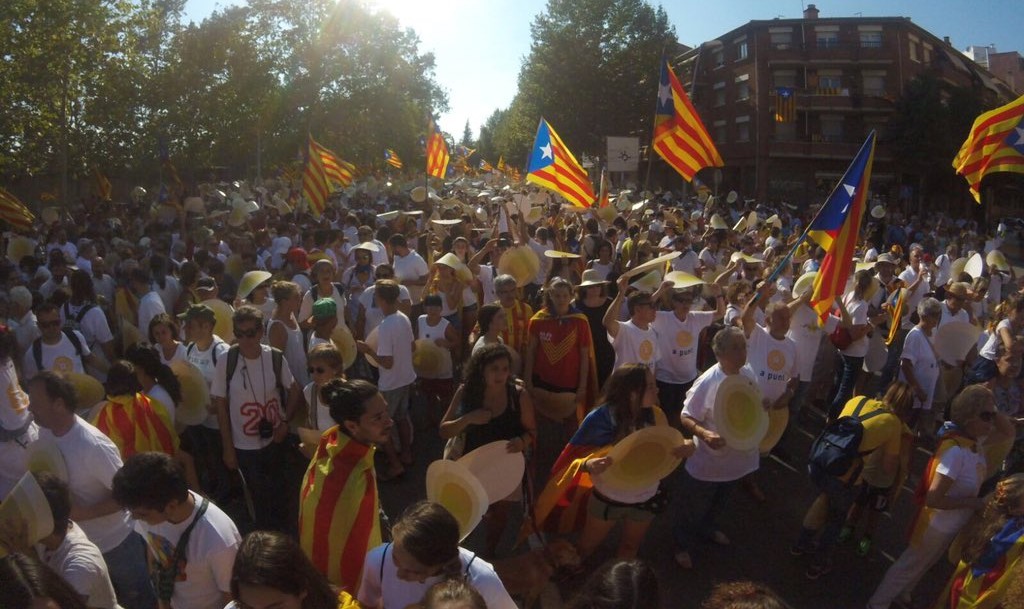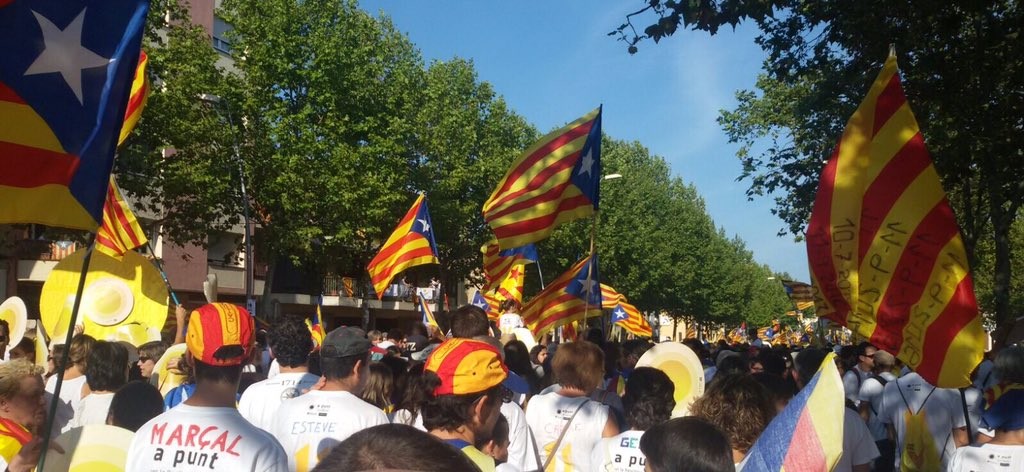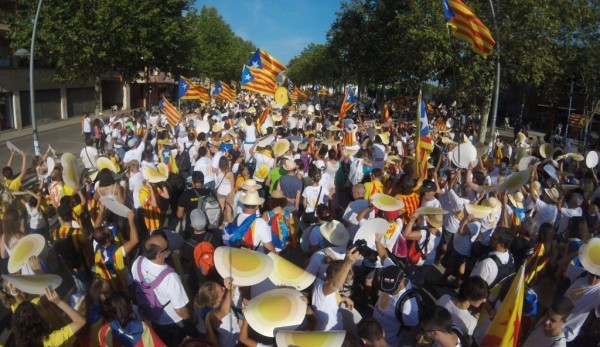In the latest of our interviews about the quest of many Catalans for independence from Spain, 16-year-old student Judith Tortajada Juanals from Banyoles talks to Ellis Palmer Babe, EA WorldView’s Digital Media Editor.
Tortajada Juanals speaks about her family history, her experience as a volunteer at the Catalan National Day on September 11, and the current political situation. She also provides the photographs for the article.
See also Catalonia Interview: After National Day Celebrations, The Complications Start
Catalonia Interview: “Hitting the Political Accelerator” for Independence
Catalonia Opinion: The Dawn of Catalan Independence
Tell us a little bit about yourself, Judith.
My name is Judith Tortajada Juanals, I’m 16 and I study at the Pere Alsius Institute (high school) in Banyoles, a town in the province of Girona. I became interested in the politics and history of Catalonia when I was 10 years old, but it was not until last year that I joined the ANC (Catalan National Assembly) and other independentist civil society groups.
How did you come to be involved with Catalan civil society groups? How do these groups influence the process?
I am a supporter of the ANC, as well being a member of the JERC (Young Republican Left of Catalonia) in my hometown of Banyoles and of Omnium Cultural.
The ANC has had an important role in the independence process. It was founded in 2011 and consists of Catalans who believe that the only way the Catalan people and identity can survive is to express their desire for democratic self-determination, as other nations of the world have already done. Omnium Cultural has focused more on defending the Catalan language and culture. It has never been as focused on the independence process as the ANC — Omnium is focused more on Catalan socio-cultural issues than on political mobilization.
These two organizations have been in charge of organizing the Diada (Catalan National Day) celebrations/protests from 2012 and other major events, such as the Concert for Freedom held that was held in June 2009 at the Camp Nou, which I was lucky enough to be able to attend).

Why do you, as a young person, support independence for Catalonia?
My grandfather was forced to fight for the Franco regime against the maquis (Republican guerrilla fighters) in the 1940s, shortly after the end of the Spanish Civil War which Franco won. He’s still alive today and he told me that two of his brothers fought on opposite sides during the Civil War: one was a Republican, the other a nationalist. He can still remember the time when they finally returned home at the end of the brutal conflict and emotionally embraced each other.
Young people want to see the creation of an independent Catalonia because we want to break away from a state rooted in the Franco dictatorship. We do not want to belong to a state that does not return the taxes that Catalans pay to it. If we got that money back, we can invest it in our schools, universities, hospitals, and public transport. Moreover, young Catalans do not want to pay for a state that supports archaic, corrupt, and manipulative institutions, such as the Spanish monarchy.
In my house, we have always spoken in Catalan and had strong Catalanist sentiment. On a personal level, I want to be able to achieve the desires of my ancestors who fought with blood and sweat so I could think, write, and speak freely in Catalan.
How did you come to be involved in the Diada?
As a member of the ANC, I was part of the volunteer team at this year’s Diada. It was stressful work, but I found it very exciting too and I’ve been very affected by what I saw that day. Despite all of the demonstrations I have been to, I’ve never really been fully aware of the true strength and enthusiasm of the Catalan people for the cause of independence. You don’t always fully appreciate what’s going at the Diada demonstrations until you really are in the thick of it all.
I was in section 26 in the city of Salt. At first, I was just selling t-shirts, but when 17:14 [representing the year 1714, when Barcelona was defeated by Bourbon forces] was approaching, I had to hand out signs to people for them to put up in the air. It was a very stressful time for me: all of us volunteers were sweating buckets.
I was at the first of all of the stops, where people from other sections mingled, and our job was to guide people to where they were supposed to be. I was the one who, when the different points had finished, had to run to look for more people at different sections or different parts.
In some places, people left shortly after the main event, but in other parts, there were many people there and they stayed for a while afterwards.
I worried a lot on the day, but I really enjoyed being able to talk to people and get involved as a volunteer.

What do you think will happen with the Catalan situation in the coming months?
I think this year will be definitive as the Spanish government is, well, not functioning as a government. They are all arguing amongst themselves, and we’ve voted in a independentist government with a mandate to deliver us independence.
The people have already told our political institutions what we want: independence from Spain as soon as possible. Now we just need the independentist political groups to agree with each other and start the final process. We know that the parts of the authorities are prepared to make changes ahead of independence, such as the creation of Catalonia’s own treasury to ensure a stable financial transition.
I think if the political classes do not hurry up, the process will start to lose momentum and people will look for extreme avenues. We cannot wait much longer for a “negotiated settlement”. As one of the Diada protest slogans stated: “We’re in a hurry!”

